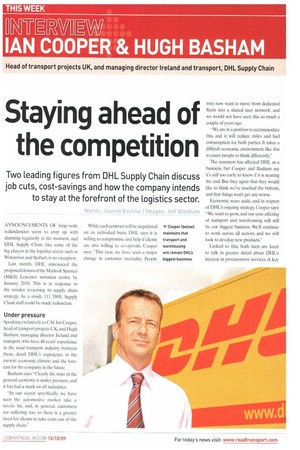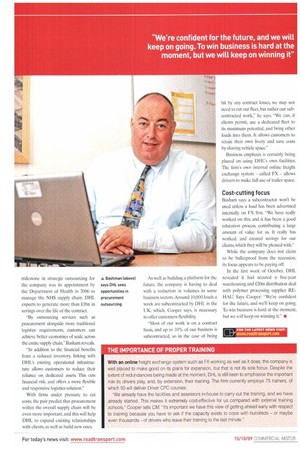Staying ahead of the competition
Page 16

Page 17

If you've noticed an error in this article please click here to report it so we can fix it.
Two leading figures from DHL Supply Chain discuss job cuts, cost-savings and how the company intends to stay at the forefront of the logistics sector.
Words: Joanna Bourke I Images“f Illoxharn
ANNOUNCEMENTS OF large-scale redundancies seem to crop up with alarming regularity at the moment, and DHL Supply Chain, like some of the big players in the logistics sector such as Wincanton and Stobart, is no exception.
Last month, DI-IL announced the proposed closure of the Marks & Spencer (M&S) Leicester sortation centre by January 2010. This is in response to the retailer reviewing its supply chain strategy. As a result, 111 DHL Supply Chain staff could be made redundant.
Under pressure Speaking exclusively to CM, Ian Cooper, head of transport projects UK, and Hugh Basham, managing director Ireland and transport, who have 48 years' experience in the road transport industry between them, detail DHL's experience in the current economic climate and the forecast for the company in the future.
Basham says:"Cl early the state of the general economy is under pressure, and it has had a mark on all industries.
"In our sector specifically, we have seen the automotive market take a severe hit, and, in general. customers are suffering too, so there is a greater need for clients to take costs out of the supply chain."
While each contract will be negotiated on an individual basis, DHL says it is willing to compromise and help if clients arc also willing to co-operate. Cooper says: "This year. we have seen a major change in customer mentality People may now want to move from dedicated fleets into a shared user network, and we would not have seen this so much a couple of years ago.
"We are in a position to accommodate this, and it will reduce miles and fuel consumption for both parties. It takes a difficult economic environment like this to cause people to think differently."
The recession has affected DHL as a business, hut Cooper and Basham say it's still too early to know if it is nearing the end. But they agree that they would Like to think we've reached the bottom, and that things won't get any worse.
Economic woes aside, and in respect of DHL's ongoing strategy, Cooper says: "We want to grow, and our core offering of transport and warehousing will still be our biggest business. We'll continue to work across all sectors, and we will look to develop new products."
Linked to this, both men are keen to talk in greater detail about DHL's interest in procurement services. A key milestone in strategic outsourcing for the company was its appointment by the Department of Health in 2006 to manage the NHS supply chain. DHL expects to generate more than £1bn in savings over the life of the contract.
"By outsourcing services such as procurement alongside more traditional logistics requirements, customers can achieve better economies of scale across the entire supply chain," Basham reveals.
"In addition to the financial benefits from a reduced inventory, linking with DHL's existing operational infrastructure allows customers to reduce their reliance on dedicated assets "Ihis cuts financial risk, and offers a more flexible and responsive logistics solution:.
With firms under pressure to cut costs, the pair predict that procurement within the overall supply chain will be even more important, and this will help DHL to expand existing relationships with clients, as well as build new ones. As well as building a platform for the future, the company is having to deal with a reduction in volumes in some business sectors. Around 10,000 loads a week are subcontracted by DHL in the UK, which, Cooper says, is necessary to offer customers flexibility.
-Most of our work is on a contract basis, and up to 10% of our business is subcontracted, so in the case of being
hit by any contract losses, we may not need to cut our fleet, but rather our subcontracted work," he says. "We can, if clients permit, use a dedicated fleet to its maximum potential, and bring other loads into them. It allows customers to retain their own livery and save costs by sharing vehicle space."
Business emphasis is certainly being placed on using DHL's own facilities. The firm's own internal online freight exchange system called FX allows drivers to make full use of trailer space.
Cost-cutting focus
Basham says a subcontractor won't be used unless a load has been advertised internally on FX first. "We have really worked on this, and it has been a good education process, contributing a large amount of value for us. It really has worked, and created savings for our clients, which they will be pleased with."
While the company does not claim to be bulletproof from the recession, its focus appears to be paying off.
In the first week of October, DHL revealed it had secured a five-year warehousing and £20m distribution deal with polymer processing supplier REHAIL Says Cooper: "We're confident for the future, and we'll keep on going. To win business is hard at the moment, but we will keep on winning it." • rEFOR THE LATEST HEWS VISIT: tetvww.roadtransport.Ld.












































































































































